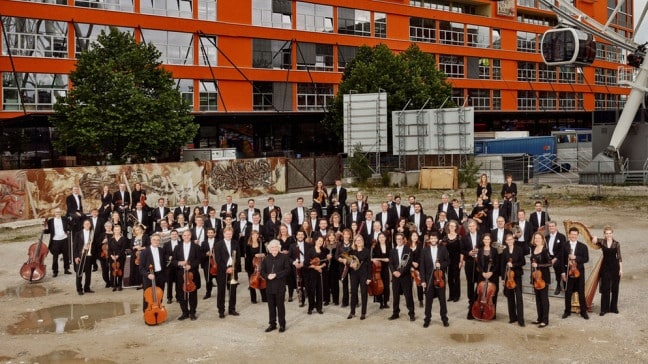By special request: Verdi vs Wagner
mainWe’ve been asked to repost the great debate from the Royal Opera House. Enjoy.

We’ve been asked to repost the great debate from the Royal Opera House. Enjoy.

He is already music director of the Metropolitan…

The tenor Ian Bostridge shocked Symphony Hall Birmingham…

The conductor continues his agitation for a new…

The ARD competition has sacked Liang Wang, principal…

Session expired
Please log in again. The login page will open in a new tab. After logging in you can close it and return to this page.
A brilliantly informative and entertaining debate. Thanks for posting this.
Great to be reminded to see it again. One thing, Norman, I thought you emphasised too much or too long on the vileness of the character of Wagner, while we all know that often these bleak characteristics are outshone by Wagner’s genius as a conceptualist and a chord-smith. These qualities are undeniable. However it is not for nothing that Stravinsky could state that Falstaff was Wagner’s best opera but not Verdi’s best, which summarises why one may claim that Verdi in several respects was better. (He of course meant that Verdi in one small opera had emulated the principles of the durchkomponierte opera but still he thought higher of Macbeth, La Traviata and perhaps Otello). And your point that Va Pensiero fits so well in Hebrew culture is a nice personal anecdote, but not that strong as a point against Wagner.
Outside this this fact was a match of two against one, as the intermediator is a Wagnerian.
No, it wasn’t. Fry was a very fair moderator in the debate and did really interfere much at all.
Norman just lost the debate because he focused on Wagner’s personality flaws and tried to score cheap points with the audience by appealing to their anti-German bias, just like he often does on this website here, but apparently that didn’t work. Singing (well, sort of singing) “Va, pensiero” in Hebrew didn’t really help much either although it was very entertaining as a fail. At the same time, Hensher simply had far better and more relevant arguments.
Still, a very entertaining and, at least to some degree, informative debate.
Second sentence should read: “…and did not really interfere much at all.” of course, otherwise it wouldn’t make much sense.
Nice to see this discussion again. But very painful to hear Wotan’s Farewell sung so abominably. (Also the orchestral entrance of this bit leaves quite much to be wished for.) The focus upon W’s ‘bad character’ is superficial, because his antisemitism was, before anything else, a cultural critique, and regrettably clothed in racist terms which was, by the way, just common in the 19th century.
Reflecting on the relative ‘greatness’ of these two extraordinary composers, and as someone who loves all the good things in and about Wagner, when thinking of what really constitutes greatness in a broader context, it must be said that Norman Lebrecht’s advocacy brought it home quite well: as a phenomenon, Verdi is greater, because of being more whole. But also in purely artistic terms the outcome of a comparison can be surprising. Real greatness in artistic terms means the ability to create works which are harmonious in the sense that nothing ‘sticks-out’ as something that does not fit the whole, and / or is artistically inferior to the rest. Wagner’s works, ALL of them, suffer from episodes that are not so good, there is always some inner contradiction, in aesthetic / musical terms. For that reason Mozart, Beethoven and Brahms can count as really great, given their ability to write works that are through-composed and even in quality. In this sense, Verdi’s Otello has an even, strong artistic quality that Wagner was never able to achieve. Also Debussy’s ‘Pelléas’ is incredibly even in quality through-out without any uninspired episodes, which can easily be found in any Wagner work. For all Wagner’s psychological insights, ambiguities, and psychological and musical sophistication, his protagonists are less credible as human beings than Verdi’s, however simpler and more straight-forward they may seem.
As for Wagner’s creation and musical painting of stage characters: Verdi would never have made the mistake of Wagner’s Siegfried, who destroys any scene where he sets a foot in, and who cannot possibly bear the symbolic meaning the composer wished him to represent. But we all patiently bear the boredom through which a Wagner work often leads us, to wake-up again when the fire strikes from the pit and the stage offers unforgettable situations and scenes.
Norman claims Verdi wrote some 40 operas but even if we count the revisions as individual works, the generally accepted count is ca. 27.
Much more serious is your claim the only Verdi composed an opera in which the Hebrews are heroes except Handel and his were oratorios. Poppycock. The Lenten “azione sacra” was a long-standing tradition in Italy. Ever hear of Rossini’s “Mose in Egitto?” Or its French rifacimento “Moise.” There are many such works such as Donizetti’s “Diluvio Universale” (Noah). Hebrews heroes star in all of them. Verdi was presented with Nabucco by Merelli and he set it. The German Otto Nicolai refused to set it. But he had set a version of Ivanhoe in which jews are treated sympathetically.